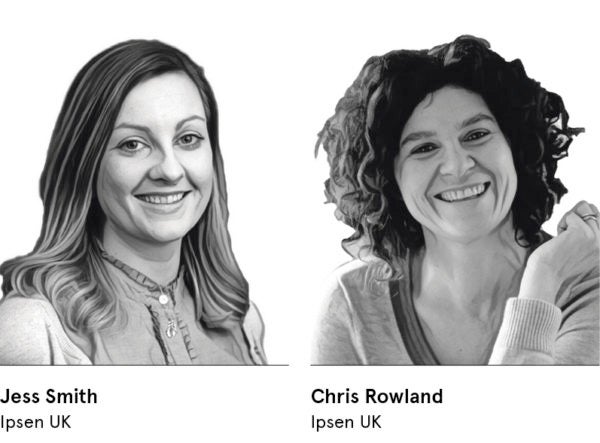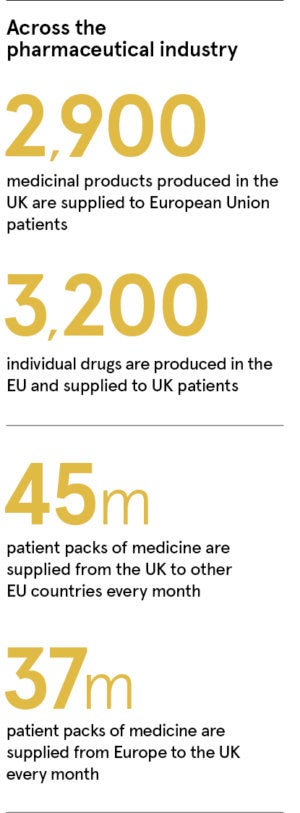 A deal or no-deal Brexit raises many questions for pharmaceutical companies in the UK, including stockpiling of medicines, as well as the approval of new medicines.
A deal or no-deal Brexit raises many questions for pharmaceutical companies in the UK, including stockpiling of medicines, as well as the approval of new medicines.
The Westminster government has called on pharmaceutical companies to stockpile a minimum of six weeks’ supply in the UK, above their normal buffer supplies in case of disruption come Brexit day on March 29, 2019. The aim is to ensure minimal interruption whatever the outcome of a deal.
“There is no question that ensuring patient supply remains the priority for Ipsen,” says Jess Smith from Ipsen UK, a leading global biopharmaceutical company with a focus on oncology, neuroscience and rare diseases, and with worldwide sales of more than €1.9 billion in 2017.
Planning is an issue as the industry’s supply chains are complex and integrated across Europe. More than 2,900 medicinal products produced in the UK are supplied to European Union patients, with 3,200 individual drugs produced in the EU and supplied to UK patients. Every month, 45 million patient packs of medicine are supplied from the UK to other EU countries. Over the same timeframe, the UK receives 37 million packs from Europe. It’s a complex arrangement.
“But this is more than just a question of medicine supply,” Ms Smith adds. “The UK is one of the hubs for innovation across the life science and healthcare sectors worldwide, home to research institutions, clinical trial centres, licensing bodies and manufacturing, to name but a few.
“Brexit has been the spark to reignite Ipsen’s discussions about partnerships, and how we must work together if we’re to deliver optimal patient outcomes in the UK, Europe and beyond. So, when we talk about the future of pharma, it’s simple, it must continue with the same ambition and commitment.”
“For Ipsen, now is not the time to back away; we must stay true to our commitment here in Britain. We are all in this together. Yes, the dynamics are changing, but we have a responsibility to deliver the highest-quality medicines, meet stringent regulatory requirements and quality measures for patients, as well as continue to work with other groups and partners to advance research, and support the UK’s position as a leading environment for health and life sciences.”
Brexit has been the spark to reignite Ipsen’s discussions about partnerships, and how we must work together if we’re to deliver optimal patient outcomes in the UK, Europe and beyond
Whatever type of Brexit occurs, the ecosystem of providers, including pharmaceutical companies, medical research institutions, industry bodies, public health organisations, the NHS and others across the UK and Europe, share enough common goals to find solutions so patients, wherever they reside, don’t lose out come March 2019.
Ipsen, a company with headquarters in Paris, sells more than 20 drugs in over 115 countries worldwide and has had a presence in Britain since 1981. The UK is one of its three global hubs, employing more than 700 people across three sites with a focus on research, development, manufacturing and distribution. The company continues to invest heavily and expand here.

“We are optimistic about our presence in the UK and for future collaborations,” says Ipsen UK’s Chris Rowland. “Our partnership values must hold true over time, as we are committed to increasing the number of people and groups that we work with both within the UK and the EU. Our organisational priorities and commitment to patients remains the same: those who need treatment don’t have time to wait.”
Ipsen is proud to work in partnership with the NHS across a number of projects, including programmes that look at supporting the health service to ensure the processes and pathways are in place for clinicians to support patients. It is important that disease management and treatment supports the patient so they can enjoy their life while living, which is why we partner with multi-disciplinary teams and homecare service providers to empower the self-care of patients living with some forms of cancer, and their carers.
In addition, Ipsen teams are collating real-world evidence on the use of their medicines. As clinical trials hold stringent inclusion/exclusion criteria to evaluate the efficacy and tolerability of a medicine, Ipsen is working with Trusts across the NHS to collate data on their medicines in particular within the area of neurosciences to evaluate their use in the real-world setting.
This is a critical step and part of our commitment as a partner to clinicians who care for patients. This data can be crucial to support clinicians to enable them to manage patients, using insights from those who may be living with other conditions alongside the one they are receiving treatment for.
“This is one example of partnerships we are proud of at Ipsen,” says Ms Rowland. “We recognise that data, making use of data and digital tools to support research, which contribute to the improvement of patient care, is a priority within the life sciences industrial strategy, and we hope to be able to contribute to this and other priorities for the UK healthcare landscape.
“Ipsen continue to invest in a strong presence here, which is why we have research, development, commercial and corporate functions based in the country, not just supporting our UK operations, but our global businesses too. We have an ambition to bring one new medicine or indication to market every year. It is a partnership we want to continue for years to come.”
There’s no doubt that whatever happens with Brexit, partnerships are at the heart of the future of healthcare and the future of pharma in the UK, and a principle Ipsen is committed to.
This content is authored and sponsored by Ipsen Limited.
Date of preparation: November 2018. Job code: ALL-UK-000688


